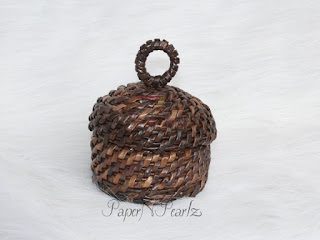One of the traditional methods of basket-weaving involves a technique called coiling. This technique combines a process of coiling materials such as grass and binding them together using flexible fibres.
The same process can be applied to tubes made from newspaper or magazines. Here the tubes are used in both the processes - they are wound and held together by other tubes. I first came across this technique of weaving in Pinterest and have since been fascinated by the method.
When I got an opportunity to try it out, I first attempted it using newspaper tubes. Needless to say, it wasn't much of a success! My coiling was loose and the tubes that held the coils together were not placed close enough to give a tight weave. And once you fail, even in something like craft work, it takes a lot of courage to get back on the proverbial horse, doesn't it?
So, after many months and with a lot of hesitation, I tried out this blue tray, in the shape of a leaf. The tubes are made from newspaper strips, around 10 mm in width and 260 mm in length, rolled around a 2mm skewer. I painted it prussian blue, since that was the colour I had in abundance! This time, since I knew what to expect, I was able to coil much better. Overall, it gave me much better results than my first attempt. The shaping is still a problem and that takes more practise I guess. On the whole, I am quite pleased with this attempt.
While this technique is more challenging than regular weaving, the result if much more pleasing. But I would not attempt this type of weaving unless I had a lot of time, because without doubt, it is much more time-consuming that the regular weaving that I do. This tray took me a good 3 days to complete! And that is just the coiling part. Time taken for rolling the tubes, painting and glazing the final product also needs to be considered.
Model Details:
Model: Coiled Blue Leaf Tray
Difficulty Level: Complex
Tutorial (making newspaper tubes): Youtube
Tutorial (coiling or root-weaving technique): Youtube






























